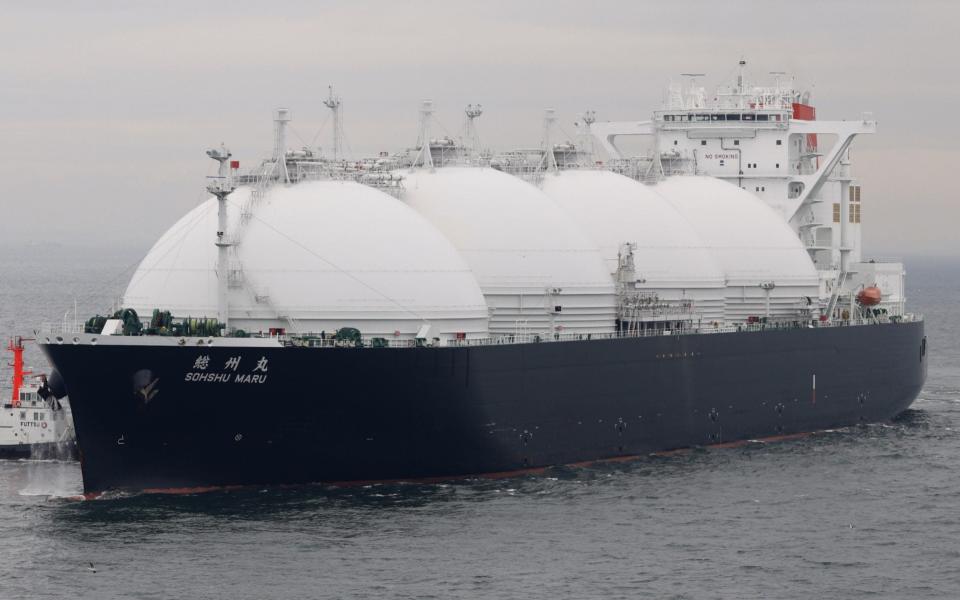Cargo ships divert gas from China to Britain

Huge cargo ships carrying liquid gas that were destined for China have changed course and are now heading towards the UK as Europe remains trapped in a major supply crunch.
While the Continent’s energy crisis and high prices have attracted ships away from other parts of the world, the new arrivals are now bringing prices down. Benchmark Dutch front-month gas fell for a fifth day yesterday, dropping as much as 9.2pc in Amsterdam.
The UK gas price rocketed to a record 470p per therm last week, up from just 50p in April, but has since fallen to under 270p.
James Huckstepp, managing analyst at S&P Global Platts, said tankers are flocking towards British shores in a move that is “critical to tempering even more extreme prices and demand destruction in Europe”.
He said: “We are seeing cargoes previously destined for Asia now diverting to the UK. This is particularly the case for those cargoes originating in the US, given the journey between the US and Europe is much shorter than that to Asia.”
The number of US tankers heading for European ports jumped by one third last weekend, according to Bloomberg, with 20 vessels bearing American gas heading for Europe and another 14 heading in the general direction of Europe while awaiting final orders.
The number of cargoes travelling to the UK and elsewhere in Europe will raise hopes that new supplies can ease the energy crisis and help lower gas prices, which have declined after soaring to record highs last week. That will bring some relief to UK energy bosses, who met Downing Street officials this week for crunch crisis talks.
Ahead of the meeting, Stephen Fitzpatrick, the boss of Britain’s second-largest supplier Ovo Energy, warned that bills were “almost certain” to double to £2,000 per household.
It is understood that the Government could facilitate a deal that would see the industry given access to a £20bn fund, which they could repay at a rate of £2bn a year over 10 years.
Nathan Piper, head of oil and gas research at Investec, said European and UK prices have surged above Asian liquefied natural gas (LNG) prices, attracting volumes away from China.
The additional supplies will provide some much-needed respite ahead of looming winter shortages. However, one Singapore-based trader told S&P Global Platts earlier this month that they are not sure “how sustainable these diversions to the Atlantic will be”.
The cost of energy in Europe has been soaring this year due to low levels of gas storage, tight supplies from Russia and lower output from clean energy sources, in part because of weak wind speeds. Some 26 retail energy companies have gone bust since August.
The country gets most of its gas via pipes connected to the North Sea, Norway and continental Europe, but in normal times it also gets about 20pc via ships in the global market.
Russia has been accused of withholding extra pipeline gas supplies to mainland Europe in recent months, in an attempt to pressure Germany into starting up its new pipeline, Nord Stream 2.
It comes as new data show that shipments of gas from Russia to the UK increased this year.
As of last week, Russia had sent 29 shipments of LNG to the UK during 2021 – compared to 22 a year earlier – according to data from S&P Global Platts Analytics. It marks the second highest annual figure since the first Russian shipments to the UK in 2017.
Proponents of the North Sea industry argue that the Government could boost Britain’s energy security by granting permission for more domestic oil and gas drilling. About 10 licenced North Sea projects are expected to be up for development approval and final investment decisions in next year, but are likely to draw opposition from climate change activists.
Protesters have been emboldened by Shell’s decision earlier this month to pull out of the Cambo field development. Its partner, Siccar Point Energy, subsequently paused the project.
In October, Friends of the Earth, using analysis from campaign group Uplift, found in total about 30 licenced UK offshore oil and gas projects are in line for development approval by 2025.
The Government has said it supports domestic production as oil and gas still fulfils about 75pc of total UK’s energy needs – fuelling most boilers, cars and almost 40pc of UK power supply.
However, it has also introduced a “climate compatibility” checklist that new oil and gas projects need to pass if they are to get a licence. Supporters of North Sea drilling say it results in lower emissions than importing gas from other parts of the world.




